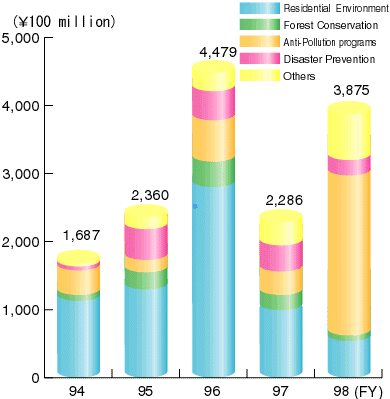Official Development Assistance (ODA)
Japan's Environmental ODA
- Steady Progress towords Sustainable Development -
The Official Development Assistance Charter formally adopted by the Cabinet in June 1992 includes environmental conservation as a basic philosophy underlying Japanese aid; its principles mandate that aid be implemented in a manner that addresses both environ-mental and developmental concerns. The Medium-Term Policy on ODA published in August 1999 also lists environmental conservation as a priority task.
Japan began to bolster its environmental cooperation in the early nineties. Environmental cooperation today follows the Initiatives for Sustainable Development towards the 21st Century (ISD) announced in June 1997 at the Special Session of the United Nations General Assembly for the Overall Review and Appraisal of the Implementation of Agenda 21 (UNGASS). During the Third Conference of the Parties to the United Nations Frameworks Convention on climate change (COP3) held in Kyoto in December 1997, the Kyoto Initiative on aid for global-warming programs in developing countries was announced by Japan. This initiative aims at assisting developing countries in taking steps during the development process to deal with the global warming issue, which threatens sustainable development on a worldwide scale. Under the Initiative, Japan provides active support for global warming programs in addition to traditional environmental programs.
Environmental conservation within the Japanese ODA framework

- "Basic Philosophy" positions enviremental conservation as a "task for all humankind."
- "Principles" mandate that environmental conservation and development be pursued " in tandem."
- "Priority issues" list environment among "global problems".
- Lists "environmental conservation" among "Priorty issues and Sectors."
- Explicitly includes "environmental conservations" among" points to be followed in the implementation and management of ODA."
- Articulates a "philosophy" and "program of action" for environmental ODA.
- Specific actions for climate change programs [specific actions for ISD]
- Formulated for major aid recipients in order to enhance country-by-country approach.
Philosophy of ISD
- Human Security:
- Environmental degradation threatens the human existence, and constitutes a security issue in a broad sense.
- Ownership:
- Developing countries assume the primary responsibility and roles to address environmantal issues. Donor countries assist such self-help efforts.
- Sustainable Development:
- The objectiive of environment cooperation should be to realize sustainable development, paying attention to the different economic and social situation of each developing country.
Environmental Japan's ODA

Note:
1) The annual figure is the total of bilateral loans, grant aid and technical coope-ration (implemented through JICA) and excludes assistance via international organizations.
2) Others include ODA for natural environment, environmental administration and ocean pollution control measures.
Bilateral Technical Cooperation in Japan's Environmental ODA
(Technical cooperation through JICA including those for East European countries)

Note:
The figures indicate new trainees in each fiscal year for the acceptance of trainees and the total of new and continual assignments for the dispatch of experts and JOCVs.
